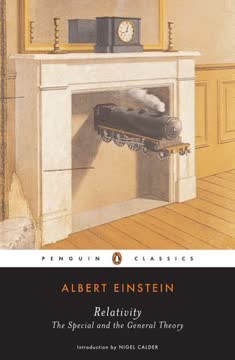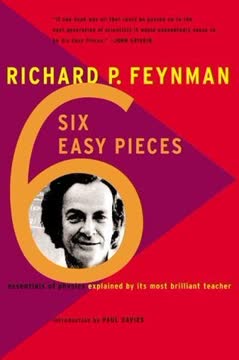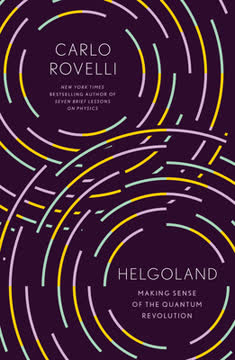Key Takeaways
1. The Birth of Quantum Mechanics: Challenging Classical Physics
"If science is the attempt to extract order from confusion, then in early 1927 it veered onto an unexpected path."
Scientific Revolution Emerges. Quantum mechanics emerged as a radical departure from classical physics, challenging long-held assumptions about the nature of reality. The development was not a sudden breakthrough, but a gradual process involving multiple scientists wrestling with fundamental questions about atomic behavior.
Key Scientific Transformations:
- Classical physics assumed predictable, mechanical universe
- Quantum mechanics introduced unpredictability and probability
- Scientists moved from deterministic to probabilistic understanding
- Electron behavior became fundamentally uncertain
Intellectual Pioneers. Scientists like Werner Heisenberg, Niels Bohr, and Albert Einstein played crucial roles in developing and challenging quantum mechanical principles. Their intellectual battles revealed the complex process of scientific innovation, where breakthrough ideas emerge through rigorous debate and creative thinking.
2. Uncertainty: The Fundamental Limitation of Scientific Knowledge
"You can measure the speed of a particle, or you can measure its position, but you can't measure both."
Measuring the Immeasurable. Heisenberg's uncertainty principle fundamentally transformed scientific understanding by revealing inherent limitations in measurement. The principle suggests that the more precisely one property of a particle is measured, the less precisely another related property can be known.
Philosophical Implications:
- Perfect scientific knowledge is impossible
- Observer influences the observed phenomenon
- Measurement creates uncertainty, not clarity
- Traditional cause-and-effect thinking breaks down
Radical Scientific Insight. The uncertainty principle challenged centuries of scientific thinking that assumed objective, precise measurements were always possible. It introduced a probabilistic view of reality where precise prediction became fundamentally impossible at the quantum level.
3. Probability Replaces Determinism in Understanding Nature
"Quantum mechanics is very imposing. But an inner voice tells me that it is not the real McCoy."
Statistical Understanding of Reality. Quantum mechanics introduced probability as a fundamental principle of understanding natural phenomena. Instead of precise predictions, scientists now work with probabilistic outcomes and statistical likelihood.
Transformative Concepts:
- Randomness becomes a fundamental feature of nature
- Individual events become inherently unpredictable
- Statistical analysis replaces deterministic models
- Cause-and-effect relationships become probabilistic
Scientific Paradigm Shift. The move from determinism to probability represented a profound philosophical and scientific transformation. It suggested that the universe operates on principles of chance rather than strict mechanical laws, challenging long-held beliefs about predictability.
4. The Copenhagen Interpretation: A New Philosophical Approach to Physics
"When it comes to atoms, language can be used only as in poetry."
Philosophical Reimagining of Science. Bohr's Copenhagen interpretation proposed a radical new way of understanding scientific knowledge. It suggested that scientific observations are fundamentally limited and that different, seemingly contradictory perspectives can coexist.
Key Philosophical Principles:
- Observation changes the observed phenomenon
- Complementarity allows multiple perspectives
- Scientific language has inherent limitations
- Uncertainty is a fundamental feature of knowledge
Intellectual Creativity. The Copenhagen interpretation represented more than a scientific theory—it was a philosophical approach that challenged traditional notions of objectivity and knowledge acquisition.
5. Einstein's Resistance to Quantum Mechanics
"I cannot believe that God plays dice with the universe."
Philosophical Opposition. Einstein consistently challenged quantum mechanics, believing that the theory was fundamentally incomplete. He argued that there must be deeper, more deterministic principles underlying quantum phenomena.
Einstein's Critique:
- Rejected probabilistic understanding of nature
- Believed in underlying deterministic principles
- Proposed thought experiments challenging quantum theory
- Sought a more comprehensive scientific explanation
Intellectual Integrity. Einstein's resistance demonstrated the importance of skepticism in scientific progress. His challenges pushed quantum theorists to refine and defend their ideas more rigorously.
6. The Personal and Political Dynamics of Scientific Discovery
"Science is not the citadel Heisenberg dreamed of."
Science in Context. Scientific discovery does not occur in isolation but is influenced by personal relationships, political environments, and broader cultural dynamics. The development of quantum mechanics was deeply intertwined with the social and political upheavals of early 20th-century Europe.
Contextual Factors:
- Political instability in Germany
- Personal rivalries among scientists
- Impact of World War I and its aftermath
- Intellectual migrations and collaborations
Human Dimension. Scientific progress is fundamentally a human endeavor, driven by individual personalities, collaborations, and conflicts.
7. Quantum Mechanics Beyond Physics: Cultural and Philosophical Implications
"Quantum mechanics is very imposing. But an inner voice tells me that it is not the real McCoy."
Broader Cultural Impact. Quantum mechanics transcended physics, influencing philosophy, literature, and cultural understanding of knowledge and reality. The principle of uncertainty became a metaphor for understanding complexity in various domains.
Interdisciplinary Influences:
- Challenged deterministic worldviews
- Introduced complexity and uncertainty as fundamental concepts
- Inspired philosophical and artistic explorations
- Transformed understanding of knowledge acquisition
Intellectual Legacy. Quantum mechanics represented more than a scientific theory—it was a fundamental reimagining of how humans understand reality, knowledge, and certainty.
Last updated:
FAQ
What's Uncertainty: Einstein, Heisenberg, Bohr, and the Struggle for the Soul of Science about?
- Exploration of Quantum Mechanics: The book delves into the development of quantum mechanics, focusing on the contributions of key figures like Einstein, Heisenberg, and Bohr. It examines how their ideas challenged classical physics and introduced concepts of uncertainty and indeterminacy.
- Conflict and Collaboration: It highlights the tensions and collaborations among these scientists as they grappled with the implications of quantum theory, particularly the uncertainty principle.
- Philosophical Implications: The narrative weaves together scientific history with broader existential questions, discussing how quantum mechanics challenges classical notions of determinism and causality.
Why should I read Uncertainty by David Lindley?
- Insightful Historical Context: The book provides a rich historical context for the development of quantum mechanics, making it accessible to readers unfamiliar with the subject.
- Understanding Complex Concepts: It breaks down complex scientific ideas, such as the uncertainty principle and complementarity, into understandable segments.
- Engaging Narrative Style: Lindley’s engaging writing style combines scientific rigor with narrative flair, making the book both informative and enjoyable.
What are the key takeaways of Uncertainty?
- Quantum Mechanics Revolution: The book emphasizes that quantum mechanics represents a fundamental shift in our understanding of the physical world, moving away from classical determinism.
- Uncertainty Principle Explained: Lindley explains Heisenberg’s uncertainty principle, which challenges the classical view of a predictable universe.
- Complementarity Concept: The idea of complementarity, introduced by Bohr, suggests that different experimental setups can yield different, yet equally valid, descriptions of quantum phenomena.
What is the uncertainty principle as described in Uncertainty?
- Definition: The uncertainty principle states that certain pairs of physical properties, like position and momentum, cannot be simultaneously known to arbitrary precision.
- Implications for Measurement: This principle fundamentally alters the way scientists approach measurement in quantum mechanics, suggesting that observation itself can influence the outcome.
- Philosophical Consequences: It raises questions about the nature of reality and knowledge, suggesting that absolute certainty is unattainable in the quantum realm.
How did Einstein, Heisenberg, and Bohr influence quantum mechanics?
- Einstein’s Reluctance: Albert Einstein was initially skeptical of quantum mechanics, particularly the implications of uncertainty and probability.
- Heisenberg’s Breakthrough: Werner Heisenberg developed matrix mechanics and formulated the uncertainty principle, altering the understanding of measurement in quantum physics.
- Bohr’s Complementarity: Niels Bohr introduced the principle of complementarity, which asserts that different experimental approaches can provide valid but distinct perspectives on quantum phenomena.
How does Uncertainty address the philosophical implications of quantum mechanics?
- Challenge to Classical Philosophy: The book discusses how quantum mechanics undermines classical philosophical notions of determinism and causality.
- Bohr’s Complementarity: Lindley explores Bohr’s idea of complementarity as a way to navigate the philosophical challenges posed by quantum mechanics.
- Einstein’s Quest for Completeness: The narrative highlights Einstein’s ongoing struggle to find a more complete theory that reconciles quantum mechanics with a deterministic view of the universe.
What role did historical context play in the development of quantum mechanics according to Uncertainty?
- Weimar Republic Influence: The book situates the development of quantum mechanics within the tumultuous social and political landscape of the Weimar Republic.
- Cultural Shifts: Lindley discusses how the cultural upheaval of the time may have contributed to the acceptance of probabilistic and uncertain theories in physics.
- Scientific Community Dynamics: The interactions among key figures like Einstein, Bohr, and Heisenberg were shaped by their historical context, influencing their collaborations and conflicts.
How does Uncertainty explain the relationship between quantum mechanics and determinism?
- Determinism vs. Probability: The book illustrates the fundamental conflict between classical determinism and the probabilistic nature of quantum mechanics.
- Heisenberg’s Uncertainty Principle: Lindley emphasizes that the uncertainty principle signifies a departure from classical determinism.
- Philosophical Ramifications: The narrative explores the philosophical implications of abandoning determinism, including the impact on our understanding of free will and causality.
What is the significance of Schrödinger’s cat in the context of quantum mechanics as discussed in Uncertainty?
- Thought Experiment: Schrödinger’s cat is a famous thought experiment that illustrates the paradoxes of quantum mechanics.
- Critique of Quantum Interpretation: The thought experiment critiques the Copenhagen interpretation of quantum mechanics, which suggests that observation affects reality.
- Philosophical Implications: Schrödinger’s cat serves as a metaphor for the challenges of interpreting quantum mechanics, prompting deeper philosophical inquiries.
How did the book address the conflict between Einstein and Bohr?
- Intellectual Rivalry: The book details the intense debates between Einstein and Bohr regarding the interpretation of quantum mechanics.
- Philosophical Differences: Einstein favored a deterministic universe, while Bohr embraced the inherent uncertainties of quantum mechanics.
- Legacy of Their Debate: The conflict between Einstein and Bohr is portrayed as a crucial element in the development of modern physics.
What role did Brownian motion play in the development of quantum theory as discussed in Uncertainty?
- Discovery by Robert Brown: Brownian motion, observed by Robert Brown, was a key phenomenon that hinted at the existence of atoms and molecules.
- Connection to Quantum Mechanics: The understanding of Brownian motion laid the groundwork for later developments in statistical mechanics and quantum theory.
- Implications for Scientific Thought: The phenomenon challenged existing notions of determinism and predictability in science.
How does Uncertainty conclude regarding the future of quantum mechanics?
- Ongoing Debates: The book suggests that debates over the interpretation of quantum mechanics are far from settled.
- Search for a Unified Theory: Lindley discusses the ongoing quest for a unified theory that reconciles quantum mechanics with general relativity.
- Enduring Legacy: The legacy of quantum mechanics is one of profound impact on both science and philosophy, continuing to inspire inquiry and exploration.
Review Summary
Uncertainty explores the development of quantum mechanics and its impact on physics. Readers appreciate the book's engaging narrative style, which humanizes key scientists like Einstein, Bohr, and Heisenberg. Many found it accessible for non-experts, though some desired more technical depth. The book effectively conveys the philosophical and scientific debates surrounding quantum theory, particularly the uncertainty principle. While some reviewers felt it could be more focused, most praised its historical context and insights into the personalities involved in this pivotal scientific era.
Similar Books








Download PDF
Download EPUB
.epub digital book format is ideal for reading ebooks on phones, tablets, and e-readers.




